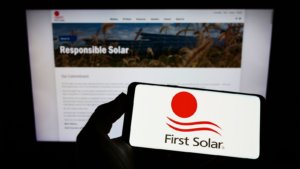
We have all heard about the woes of renewable energy stocks these days. Macroeconomic uncertainty has disincentivized consumers and businesses to stop investing in clean energy technologies or infrastructure. Moreover, high interest rates have also severely dented consumer demand for new electric vehicles, which have come with expensive car notes and car insurance. On the earnings side, renewable energy companies tend to be capital expenditure (capex) heavy. With rates as high as they are, higher capex could translate to more pressure on bottom-line margins, keeping investors interested in the space largely at bay.
Nonetheless, renewable energy technology is not going anywhere. Despite the current slump, the sector will eventually rebound from its current doldrums. Below are three renewable energy stocks to buy before it’s too late.
BYD (BYDDY)

BYD (OTCMKTS:BYDDY) has emerged from being just a maker of lithium-ion batteries to a world-class seller of new energy vehicles (NEVs). The NEV maker was even able to best long-time competitor Tesla (NASDAQ:TSLA) in terms of sales in 2023. Despite concerns about a slump in electric vehicles, BYD has largely sustained its strong growth trajectory. At the end of the first quarter of fiscal year 2024 (ended March 31st), BYD sales figures grew 46% year-over-year to 301,631 passenger vehicles, 300,114 of which were NEVs.
The intense competition in China’s domestic EV market has put pressure on the margins of BYD and other competitors, but the growth speaks for itself. In April, BYD’s NEV sales soared 48.9% to 313,245 vehicles, while in May, NEV sales also increased 38.1% to 331,817 NEVs. International opportunities, particularly in Latin America, the Middle East and Southeast Asia, await BYD and will certainly boost the carmaker’s financial figures going forward.
Not to mention, BYD is still at an attractive valuation compared to Tesla, for example. In particular, the Chinese NEV maker’s forward-looking P/E multiple is around 19.9x forward earnings, making it an attractive investment opportunity for long-term investors.
First Solar (FSLR)

Solar panel module manufacturer First Solar (NYSE:FSLR) also deserves an honest look from investors. First Solar designs and manufactures photovoltaic (PV) solar cell modules that leverage thin-film semiconductor technology. “Thin film” refers to the thin layer of non-crystalline silicon that goes into the semiconductor portion of solar panels. The process takes significantly less silicon, thus bringing overall costs downward.
Like many American solar panel manufacturers, First Solar had trouble fending off Chinese competitors making solar panels with similarly advanced technology but at lower manufacturing costs. That is set to change. The Biden Administration announced a 50% tariff on solar module imports from China. This move is certainly welcomed in the U.S. domestic solar energy sector.
First Solar’s shares have rallied 34.4% YTD, yet the company trades at 16.2x forward earnings, which is less expensive considering the environment of expensive tech equities in the United States.
iShares Global Clean Energy ETF (ICLN)

Investors who desire diversification in the sector and are still afraid to put any significant amount of money into a single renewable energy stock should consider exchange-traded funds or (ETFs). The iShares Global Clean Energy ETF (NASDAQ:ICLN) could make a good investment. The 2-billion-dollar ETF has invested in 145 different equities exposed to varying facets of the broader renewable energy sector. This includes solar energy, hydrogen energy, hydroelectricity and wind energy.
The ETF’s holdings include First Solar, Ormat Technologies (NYSE:ORA), a sizable geothermal energy business, and Plug Power (NASDAQ:PLUG), a developer of proton–exchange membrane hydrogen fuel cells.
The renewable sector has not performed well broadly, which is reflected in ICLN’s year-to-date performance. Since the beginning of the year, ICLN has fallen more than 11%. However, with inflation seemingly under control, renewable energy stocks could very well rebound, making an investment into ICLN while it has already lost lucrative value.
On the date of publication, Tyrik Torres did not have (either directly or indirectly) any positions in the securities mentioned in this article. The opinions expressed in this article are those of the writer, subject to the InvestorPlace.com Publishing Guidelines.






